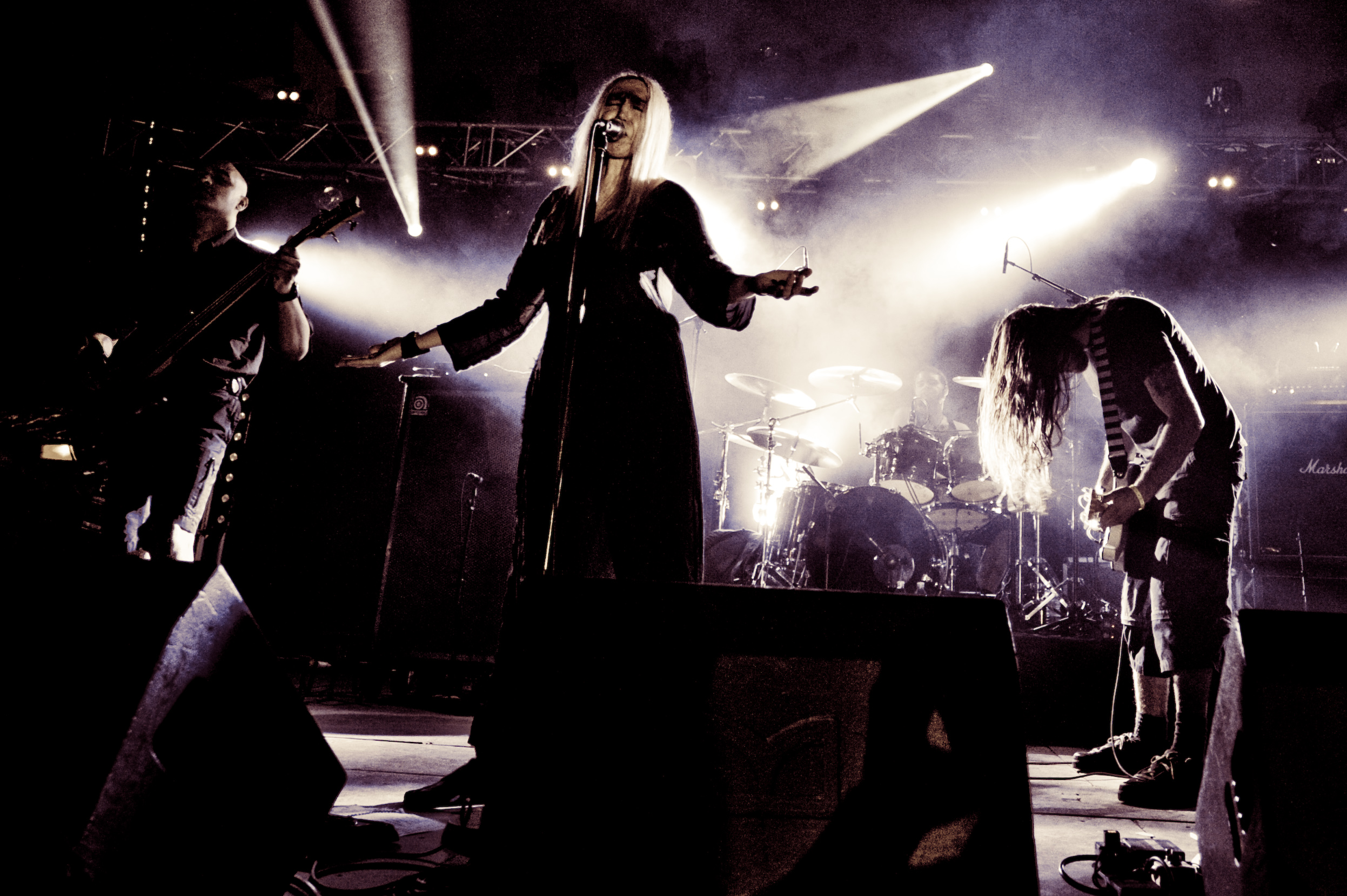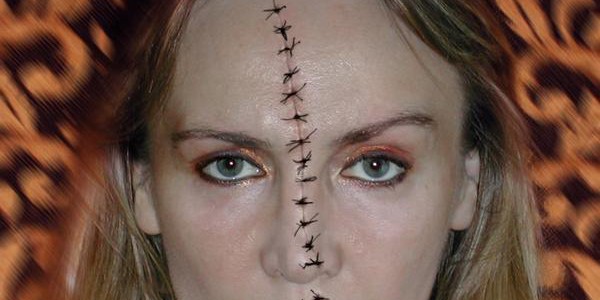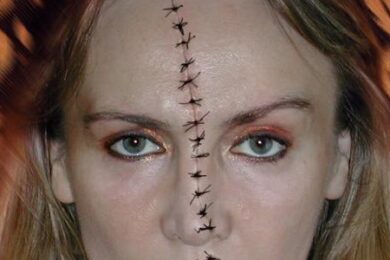"I’m blasting out of here to go to Europe, so I’m working pretty much 24 hours a day right now. I’m outside in my garden as we’re talking, and it’s really cold! It’s a really sudden transition here from summer to cold weather. I’m talking to you from Atlanta – it’s one of the worst summers of my memory, terrible heat, and now it’s really cold. As I said to my friend the other day, it takes a lot of courage and guts and pioneer spirit to live here. You’re always kind of miserable down here!"
If one only knew Jarboe from her many years with Swans as well as her extensive solo and collaborative career since, it would be all too easy to imagine this said with potentially fierce anger or intensity. But the hearty laugh and humour that she says this with is evident throughout a chat with her; this vibrant engagement is as much a part of her in conversation as her Southern American accent.
Speaking with her in preparation for an appearance at the Supersonic Festival as part of a larger European tour, it’s also clear that the last thing she ever wants to do is rest on her laurels, with references to any number of future musical and personal plans coming up. She also had a few things to say regarding her recent appearance on Swans’s epic new album The Seer, but things kicked off with a discussion about another one of her collaborations, seemingly one of the most unlikely ones: the guest appearance of Pantera/Down vocalist Phil Anselmo on 2008’s MahaKali:
How did it happen that Phil Anselmo ended up on the song ‘Overthrown’?
Jarboe: There’s weird connections in places that are not traditional, and he and I have a lot of connections. Half of my family was raised in Louisiana and he is a Louisiana guy, and I was looking for a metal vocalist who would sing with no effects, nothing at all, a naked vocal, upfront and raw, no harmonizer. The whole album is about environmental upheaval, and since he lived in New Orleans and saw Katrina, he seemed the perfect choice. So I approached him about that, he was enthusiastic and said ‘Oh I’ve got you on my iPod, man!’ And so we hit it off! Our connection was very romantic in a novel way, like something from a book or a movie. We were having long conversations on the phone while I was on the subway in New York between the studio and where I lived, talking about things we had in common, and so I felt really good about using him on the album.
How did you end up in the Atlanta area?
J: I’m down here because my father and my mother were both in the FBI. My father, he was from Chicago and was transferred to this region, and I came back down here because my mother became ill. I came back down here to take care of her and then she passed away, and I’ve been here in her house, holding down the fort. But now, in 2013 is my breakthrough moment and I’m very excited about it. I had an epiphany, about two years ago, about objects and attachments to material things in the world, so I started giving away things to charity and making other people happy, and I realised that I was happy with less. I’m now pared down to some very elemental and essential things, and the last thing will be the house itself.
So I’m going to be renting that to other people and with that money I’m just going to start traveling. I’m going to be like a vagabond! I’m going to do something daring, and I think I’ve become more radical now than I’ve ever been. I think I was radical when I moved to New York bound and determined to get to the Swans in 1984, and that radical spirit, to say, ‘Fuck it’ and go for it, is still in me at this age. So that’s what I’m doing now! My sights are first set on Colorado, on the South Western desert there, and then after that, Iceland. I’ll still be doing music, but I started thinking about it, wondering, ‘Why do I keep contributing to landfills?’ So for me the way to go – much as I hate to say it! – is download. I’m focusing on becoming a download artist – I don’t want to contribute to stuff when I’ve just given away all my stuff. That would be being a hypocrite. Trying to strip it down and make it less of a footprint on our resources.
In looking over all your collaborations and individual work over all these years, it looks like there’s a restless creativity, an emphasising of process over product. Has that always been there, has that grown more intense with time?
J: After the MahaKali album, I did another album called Alchemic for a label in South America, then a number of collaborations. Then I concentrated on website-only releases, and if you were counting albums, that’s about ten more of them past MahaKali. All that will be uploaded in 2013 – the song and dance with record labels, I’m not going to condemn it, I’m not going to judge it, we all know the issues there. To me, we don’t need them any more. You have your fans, you have your base, so that’s why I could concentrate on being creative, as part of my epiphany I mentioned. I point to my friend Zoë Keating: incredibly successful, performs all the time, and she goes direct to iTunes and uploads her work. I’m prolific with my material but I’ve decided, very intentionally, that I can go directly to my audience. We’re in a different era!

Live photo by Anthony Dubois
You’ve got your Supersonic festival appearance coming up; is there in anything in particular that is being planned for that appearance or will it be more spur of the moment, head over and see what happens?
J: The interesting thing about the whole European tour, which includes Supersonic, is that it’s an example of my own stretch or eccentricity as a performer, in that I’m doing it with a classically trained pianist and vocalist, Renee Nelson. We’re going to be reinterpreting Swans and World of Skin classics in a very beautiful way. When that’s done, we’re coming home and then immediately going on tour with Nachtmystium, a black metal band. I don’t know how many people there are that do that kind of stretch, but I’m in my element. I’m 100% punk rock and experimental and will remain true to my roots. That’s what you get with me – you’ve got to be an adventurous audience!
Considering I have a master’s degree in English lit, we have a certain amount of informed awareness to get what’s happening. You take [me] with a little spice and then you’ll have a good time. All my professors told me that I was either going to be a writer or a journalist, so I’m a bit of a deer caught in the headlights when it comes to music, but I do the best I can. My trajectory as a student was always English and writing and my thesis was on Lord Byron. I referenced a number of things in my work and they only fell on a select number of ears because music was never my primary focus.
In terms of your own vocal craft, how do you regularly rehearse? Do you practice each day?
J: The number one thing I would say about me and other singers in my experience is to do extreme aerobic exercise so that your lungs become rather mutated, so that they can become more powerful than the average human. I’m working with Renee, who is trained as a soprano, and I can hold out notes five times as long as she can. That’s because I have focused on physical activity, having pummeled myself to the point of abuse. If you can contain that breath exhalation in a note, then you can take that extra capacity to your advantage. Now, I had a number of years of vocal training earlier in life, taught to sing with no breath at all, something that’s not contemporary music. So I can move between the lines, but I don’t sing scales or anything like that.
In my mind, when I fall asleep or I’m in the shower or whatever, I’m always singing in my head, so I’m always ready for the emotive character that I’m going to become. As corny as it sounds, I’m going to "channel" – though I think that word has gotten close to being overused. You really visualise what you see as the character of those lyrics, like you visualise a person, who they are, what they eat, what they do, and then you extend that from that character. That can give you a strength that you don’t normally have. When you perform that in front of people on stage, it’s not you any more, paying your bills, mowing your lawn, it’s that character. It’s like you’re not really there – it’s been my experience since 1985, my first show with Swans, that I’m not there, I’m gone. I’m the character of the song. That’s what is weird about my own shows, it’s just my own way of doing it. That’s what enables the voices, the tonality and all that. I know that sounds fucking weird, but it’s the truth!
Perhaps an inevitable question at this point but since you’ve mentioned Swans a couple of times now: their new album is out, The Seer, which you have a guest appearance on – and that caught a few people by surprise! So, simply put, how did it happen?
J: Well, they played in Atlanta last September and I went to the concert – I had to go to the concert! I sat there in the audience, the same theatre that we had played at in 1995 and 1997, and in 1997 it was the very last American show of the band at that time.
So it was quite emotional for me, as you can imagine, being there in the audience instead of being on the stage. I sat there, and it was hard – tears were running down my face, not from sadness, but from recognizing the vocabulary, the vernacular of the music and understanding it so intuitively. It was agony to not be expressing that myself as part of the ensemble. It was ultimately the hardest thing I’ve ever done in my life. I endured it – I had seen Michael earlier that afternoon, I had taken him to a cafe and we talked, and after the show I went backstage and we talked some more. And he told me, ‘I know you want to be part of this, but this is a new thing.’ I question his logic in that, because he’s using several old members of the line-up! [laughs] And I also question if it’s a new thing using the old name.
However, as a person who found herself as co front-person and as a person who invested every ounce of blood she had in the band for fifteen years, I really don’t know the logic behind involving me. Because I’ve already proven myself – even without opening my mouth, I can play many instruments. So I was thrilled that he asked me to contribute the vocals that I did. However, I don’t like to be looked at as anything other than a serious musician or instrumentalist and singer. Anything other than that, I don’t know what’s going on there. So it’s bittersweet for me, I’ll say that.
I was lucky enough to catch the 1997 appearance in Los Angeles…
J: Ha, oh my God!
… [it was a] wonderful performance and your section of the show was incredibly striking.
J: The absolutely amazing thing, the sidestory about that show in LA? It’s going in my memoir as I write it, it’s amazing. We’re up there in the dressing room, the audience is still applauding, asking for an encore, and Michael comes into the dressing room and yells at all of us! He says that we are the worst incarnation of the Swans that has ever been, and that we have embarrassed him in his home-town, since he’s from LA. So he says all that and then he leaves the room!
Wow!
J: The entire band – and I am dead serious here – the entire band look to me, including Phil Puleo, the current Swans drummer, they all look to me and they said, ‘Jarboe… what do we do? We are ready to fly home tonight and quit.’ Every member of the band except Michael was in the room, and I said to Bill Bronson, the bass player, ‘Bill, it’s not about us, it’s not about the fact that Michael just screamed at us, it’s about the name Swans and that this is the final tour of this legendary band. We have to carry on and move forward, and we have to do the European tour.’
The US tour came first, so without me, quite frankly, there wouldn’t have been a European tour. I said, ‘We have to move forward! Swallow your ego, swallow this, and move forward and do the best you can. Forget yourself, forget what he just said, forget it.’ And that’s the goddamn truth. So the band listened to me, and this is why I say that it kinda felt like I was taking the reins at that point. They looked at me like, ‘What the hell, we just gave everything, we just got told we were worthless.’ So the ’97 tour was absolutely brutal. Brutal! We got through that thing and I quite frankly think that he does not even realise to this day that without me that European tour wouldn’t have even happened.
There was a lot going on there, and really, I think he’s changed for the better now, he has to have, because you can’t have people working for you and talk to them like that and expect them to work for you the next night. It’s very very hard when you work in extreme music, getting people to do what you want them to do, to express a visualisation, it’s quite difficult. So you have to swallow your ego and you have to realise that you’re working for a genius – which I do think Michael is – and you have to do his bidding. It’s not Swans, it’s the Michael Gira Band, and when you realise that you’re going to be fine.
Wrapping up – you’ve mentioned you’re working on your memoir, you’ve mentioned all these travels and changes. What else lies on the horizon for you, artistically, personally?
J: I think it’s pretty enormous, what I’ve already undertaken. My house, for instance, people said it was like a museum, it was so decorated, from years and years. From me to change from being a fetishistic clutter freak, a hoarder with objects from all over the world, to have nothing is quite radical! I had this light go on, knowing how mortal we really are, and to look at life as a moving thing, a moving spirit, a moving energy. I want to be part of that movement and to go to places that I’ve never been to, anonymously, experiencing it without judgement. I’m not buying into the American package of, ‘You have to have this, you have to have that.’ Fuck that! We’re all going to die, and I want to die thinking, ‘I have seen the world and I have experienced exhilaration and adventure alone on my own trails.’ That’s me! I’m not happy with my comfort zone, I’m way too rebellious.
A last question: if there is one particular artistic ambition, whether old or new, that you haven’t yet achieved, what is it and do you think it will happen sometime in the near future?
J: Yes, I know what it is and I don’t know if it will ever happen. My fantasy has always been to do a theatrical presentation, such that you do a performance in a theatre with full theatrical effects: visuals, actors, screens… [It would be a] full multimedia experience of a performance, delivering a full impact on people [who] will just be punched. They’ve left their world behind, they’ve left their problems behind, and they’ve entered a world that takes them to a place that’s 3D and live, as well as a bunch of other components. Something that will leave them transformed and inspired and uplifted. But it would require a massive amount of money to do what I’ve always wanted to do!



